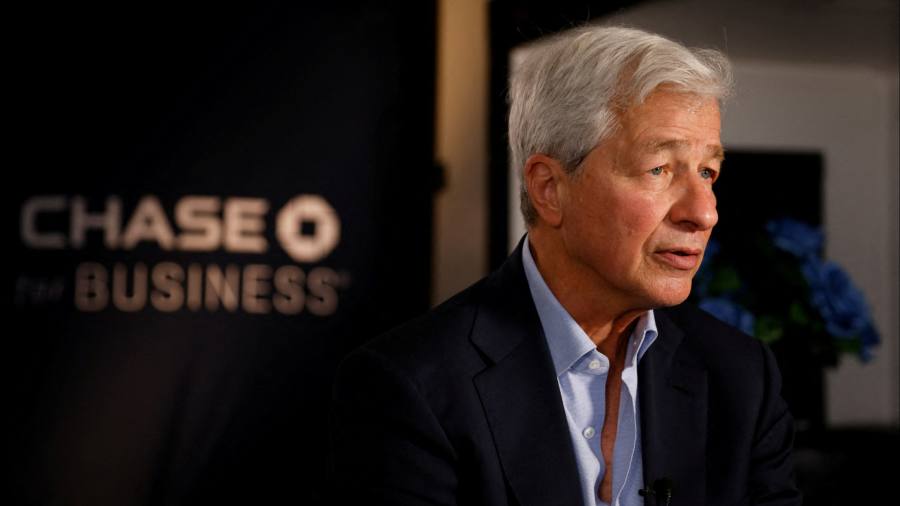JPMorgan Chase’s chief executive Jamie Dimon has called on US regulators to look into the behaviour of investors betting against bank stocks as part of official efforts to “finish” the banking turmoil.
Four lenders have failed while some hedge fund short sellers have made large profits from bets against such stocks in the past two months. Regulatory action to deal with the bank collapses has failed to halt falls in some lenders’ shares.
“The SEC has the enforcement capability to look at what people are doing by name in options, derivatives, short sales,” said Dimon in an interview with Bloomberg Television on Thursday, echoing a recent call from a US banking lobby group.
“If someone’s doing anything wrong, people are in collusion or people are going short and then making a tweet about a bank, they should go after them and vigorously,” he added.
Earlier this month the American Bankers Association called for the Securities and Exchange Commission to take measures against alleged “market manipulation”.
In a letter to the regulator the group noted “significant short sales” of several bank stocks “that do not appear to reflect the issuers’ financial status or general industry conditions”, and urged the SEC to reduce “the avenues for abusive trading”.
Short sellers borrow shares and then sell them in the market, betting that they will be able to buy them back at a lower price before returning them. The Financial Times reported last month that funds had made billions of dollars betting against bank shares during the early stages of the banking turmoil.
The SEC and other regulators introduced controversial temporary short selling bans following the collapse of Lehman Brothers in 2008. Academic studies since have tended to conclude that such bans have little positive impact and may be counter-productive by reducing liquidity and hindering market efficiency, but the idea has persisted.
Hedge funds have been pushing back against any suggestions of a ban on short selling.
“Banning short selling will only increase market volatility, hurt price discovery, and delay a recovery in regional banks’ prices,” the US trade group Managed Funds Association on Monday wrote to the SEC. “[A ban would be] unwarranted and would cause greater harm to investors, markets, and the very issuers subject to those restrictions.”
Responding to a query by the FT before Dimon spoke, the London-based Alternative Investment Management Association said it “strongly opposed” any potential short selling ban.
“There is plenty of hard evidence out there showing that it’s not short selling that is behind any particular stock underperformance,” said Jiří Król, deputy chief executive of Aima. “Bans severely inhibit the ability of price discovery at a time when it’s most needed.”
SEC chair Gensler said last week that “in times of increased volatility and uncertainty, the SEC is particularly focused on identifying and prosecuting any form of misconduct that might threaten investors, capital formation, or the markets more broadly”.
Regional banking stocks have been hit hard following the recent collapses of lenders, which began with the unexpectedly rapid disintegration of Silicon Valley Bank in March. Fellow California-based lender First Republic this month replaced it as the second-largest bank collapse in US history, with $93.5bn in assets sold to JPMorgan.
Banks including PacWest, Western Alliance and Zions Bancorp have each fallen at least 50 per cent this year.
Just over 19 per cent of PacWest’s shares are at present being borrowed for shorting, according to data from specialist consultancy S3, compared with just 4.2 per cent on loan before SVB collapsed. Short interest in Western Alliance stands at 10.5 per cent, up from 2.8 per cent.
The three most profitable positions for short sellers in the first quarter were those betting on falls for SVB, Signature Bank — which collapsed days after SVB — and First Republic, according to S3.


